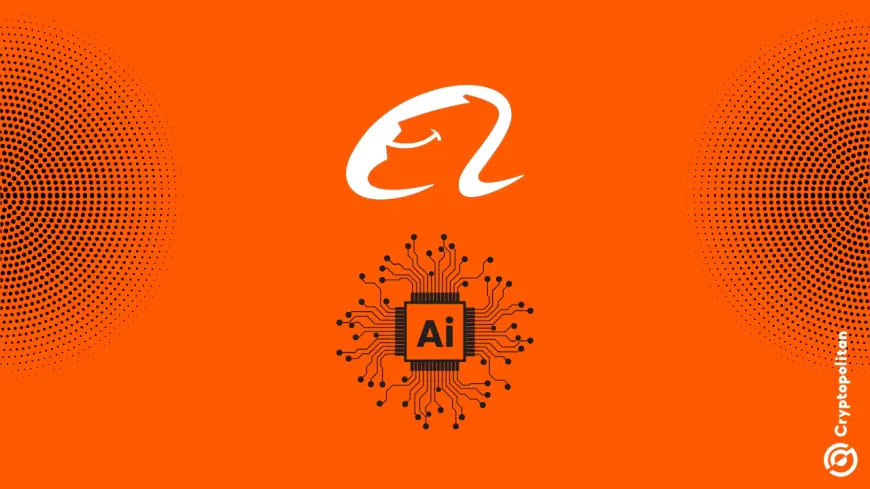Alibaba launches AI search engine to help Western small businesses source supplies
Alibaba just launched a new AI-powered search engine, Accio, specifically designed to make life easier for small businesses in Europe and the Americas. Accio reportedly works like a powerful magic wand, helping businesses track down exactly what they need with a couple of quick prompts. The name “Accio” even comes from the Harry Potter spell […]

Alibaba just launched a new AI-powered search engine, Accio, specifically designed to make life easier for small businesses in Europe and the Americas.
Accio reportedly works like a powerful magic wand, helping businesses track down exactly what they need with a couple of quick prompts. The name “Accio” even comes from the Harry Potter spell for summoning objects.
But instead of calling brooms and potions, this thing is all about pulling up wholesale suppliers and data-driven market insights. They claim Accio can boost purchase intent by 40% over standard search engines.
How Accio works in real-time for small businesses
Kuo Zhang, the president of Alibaba.com and VP of Alibaba International, spilled all the details about Accio. According to him, it’s web-based, accessible in English, German, French, Portuguese, and Spanish, and built to cut down on the time small businesses spend finding suppliers.
With Alibaba’s own AI language model, Tongyi Qianwen, under the hood, it processes language just like ChatGPT. This means Accio can take a simple text or image prompt from a user and return refined results, complete with analysis on product popularity and profit potential, in seconds.
In real-time, Accio analyzes Alibaba’s vast ecosystem of products, using data from over 50 million businesses on its international platform, sifting through around a billion product listings from suppliers in more than 100 markets.
Alibaba is counting on Accio to win over Western buyers who may not typically think of Alibaba for their sourcing needs. To get them onboard, they’ve layered in some serious tech. At its core is Tongyi Qianwen, a language model that interprets user queries and creates results similar to the natural responses from ChatGPT.
But Zhang wouldn’t confirm if Alibaba plans to bring in outside AI tech to boost Accio’s capabilities. Accio also has Alibaba’s 2023 AI translation tool integrated, a feature that’s supposedly stronger than Google, DeepL, and even ChatGPT.
This translator lets merchants connect across languages more smoothly, expanding Alibaba’s global reach. While Alibaba still pulls in most of its revenue from its domestic platforms, like Taobao and Tmall, the international game is heating up.
The translation tool is one part of Alibaba’s bigger move to challenge competitors and stake its claim in international markets. In an investor meeting last August, Alibaba said that Taobao itself could transform into a one-stop hub, thanks to AI innovations.
Alibaba’s AI moves during China’s shopping frenzy
In China, Alibaba’s big AI push was on full display during the Singles Day shopping festival. Over 500 merchants jumped onto the AI bandwagon, using a range of new tools on Alibaba’s platforms. According to a survey by Bain & Company, a full 56% of these businesses said that the AI tools had given a serious boost to their productivity, specifically through customer service support and content creation.
Merchants could essentially “talk” to the platform to find quick answers and handle customer complaints without needing a full team to do it. But while Alibaba is busy rolling out AI solutions left and right, U.S. companies are outpacing everyone in building the infrastructure for this tech boom.
The demand for AI isn’t just about the software, it’s also about power, speed, and physical space. Private spending on data centers in the U.S. alone has almost doubled since late 2022, reaching nearly $30 billion annually, per the Census Bureau.
America has gone from treating data centers as just another office category to pouring serious cash into them. This year, data center spending could even top global records, hitting around $250 billion. Data centers need massive amounts of electricity, making power consumption a critical issue as tech giants keep scaling up.
Big companies like Amazon recently tried to pull power from nuclear plants to fuel their data centers but were blocked by U.S. regulators.
Trump’s win and Silicon Valley’s shifts in the tech power game
With Donald Trump back in office, it’s “morning in America” once more, at least for his Silicon Valley supporters. At a gala at Mar-a-Lago last week, high-profile tech names like Elon Musk and Palantir’s Jacob Helberg were buzzing about Trump’s victory.
Helberg called the mood “electric” and believes this could lead to some major wins for crypto regulations and more startup-friendly policies. Venture capitalists, the lifeblood of tech innovation, are hopeful that a Trump administration could mean fewer capital gains taxes and lighter antitrust regulations—both of which would allow for more mergers, acquisitions, and big investor payouts.
Some investors are already preparing for the Trump policies. Joe Lonsdale, co-founder of Palantir, said in an interview that he wouldn’t take a government position himself but has “a lot of friends going in full-time.”
Similarly, Anduril’s Palmer Luckey confirmed that he’s in touch with Trump’s transition team. Trump’s longtime Silicon Valley backers are making strategic bets. They’re all hoping for a regulatory landscape that’s less restrictive and more crypto-friendly. If that happens, expect a flood of new money flowing into the tech and crypto markets.
While Trump backers like Jason Calacanis are openly thrilled, predicting a boom in IPOs and mergers, others have stayed loyal to Kamala Harris and the Democrats. Hundreds of venture capitalists even signed a “VCs for Kamala” pledge, though the ones who bet on Trump are now positioning themselves for what could be a lucrative few years.
As Trump’s supporters prepare to flex their influence, they’re focusing on streamlining the government and backing projects that could cut out inefficiencies. Helberg and his partner, Keith Rabois, raised $4.5 million for Trump’s campaign and have big plans to support moonshot projects, especially those that intersect with space and cutting-edge tech.
Among those hopeful for a new tech boom is Christian Garrett, a partner at 137 Ventures. He switched to supporting Trump in 2020, especially after Vance, his friend and fellow investor in Anduril, joined the Trump campaign.
What's Your Reaction?









































































































